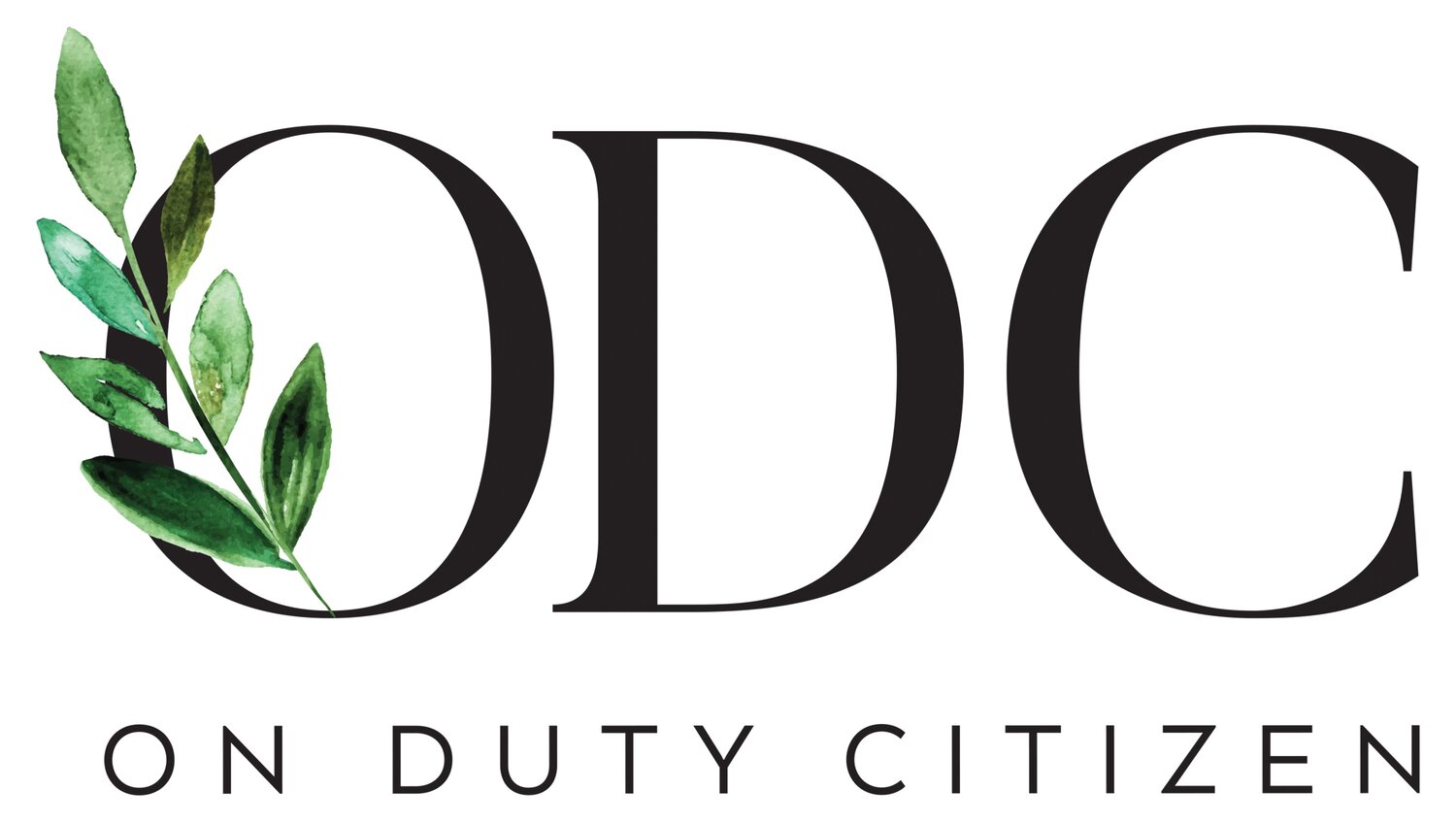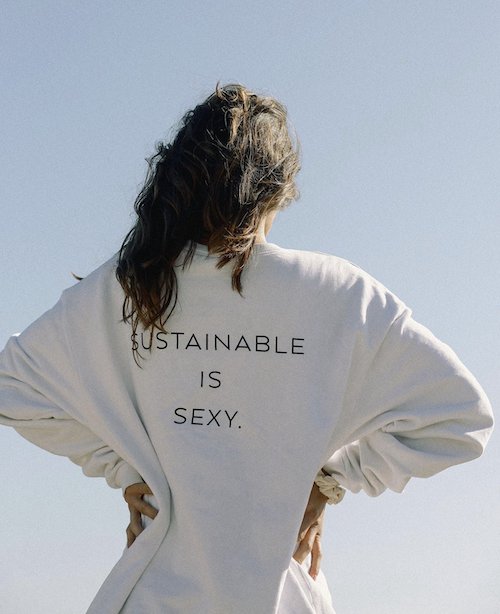ON DUTY CITIZEN
CHLOÉ RAFFERTY
1) I’m continually inspired by younger generations like yourself who give me a new perspective on many facets of the environmental movement. What inspired you to get involved in this space and why do you think your generation is speaking up and taking action?
To start, environmentalism has always been important to me. I spent a lot of my youth skiing at Mad River Glen, a small co-op owned mountain in Vermont. Being in the mountains every winter is where my passion for the environment began. There are just so many things I love about the nature besides mountains though, I love the beach, grassy fields, the woods and basically anywhere that is thriving. My overall love for the outdoors is what motivated me to become a part of the environmental movement. I believe that my generation is speaking up because we are the age group which is going to and already is suffering the most because of climate change. I think much the generation I am part of speaks up about the detriments of environmental destruction because we see it first hand in our communities, such as lack of green spaces, air pollution and plastic waste literally everywhere. We want environmentally safe and livable communities for ourselves and for future generations, which is why we are using our voices to save the environment from the dangers of destruction.
2) What are some of your daily practices you use to keep calm whilst being flooded with pressing climate change topics?
Every day I remind myself that I am doing the most that I can in my circumstances, whatever they may be. I am privileged enough to live in an environmentally stable place, so I don’t feel it is justified to constantly freak out about climate change, since it is not directly affecting me. I believe that people who live in and/or have grown up in affluent communities like mine cannot experience “climate anxiety” or “burnout” (which have both become extremely white-washed buzzwords) since we are the most privileged individuals in the environmental movement and don’t face personal challenges because of it. It is our obligation to uplift others who are suffering in unlivable environments where their basic human needs are barely being met.
3) What are some habits or tips you have to live a more conscious lifestyle? Tips for someone new to joining this movement as well as for someone not wanting to lose momentum.
I encourage everybody reading this to become a part of the environmental movement. Being part of the movement means being conscious of the choices you make which affect the health of our environment. To live more consciously, I always do my research before a decision I’m about to make monetarily. An example of this is looking to see if the food you are buying was produced with harmful chemicals, or if the clothing you are going to buy is made with materials produced sustainably and ethically. Making conscious financial decisions is so important because the fate of the earth (with the way capitalism is acting as the deciding factor) is relying on where your dollar goes.
Some other things for somebody wanting to be a part of the environmental movement is to learn about whose Indigenous land you are on, the environment specific to your location and observing what impact you have on it around you. Do as much research about whatever environmental topics interest you (for example, the ocean, a specific animal, fashion) and see where that takes you!
4) Who inspires you?
I am constantly inspired by BIPOC+ activists and organizers. Overall the entire BIPOC+ community inspires me as they are the founders of the environmental movement that I deeply respect and look up to. In the so-called united states, Indigenous activists worked diligently to end the Keystone XL pipeline over the course of 13 years, which was finally terminated on June 9th thanks to their protests and hard work.
5) What are you most optimistic about in regards to environmentalism?
I’m optimistic about the rise of ethically and environmentally educated consumers. I’m happy that environmental information resources are becoming increasingly accessible to the masses through social media. Businesses are realizing that people are becoming more conscious about what and where they spend their money on in regards to the environment, therefore some of them are starting to make progressive changes to accommodate that. I believe that eventually unsustainable brands will go out of business because nobody will want to support their unethical and unsustainable practices.
Another thing I’m optimistic about is the rise in popularity of shopping in thrift stores. I’m optimistic because it an affordable option compared to buying something brand new, which makes it far more accessible to those who can’t afford things from expensive and exclusive sustainable brands.
6) I love that you’re passionate about vintage clothing. Tell us a bit about Positance and how that came to be.
Positance is my small Instagram-based shop where I sell my secondhand clothing to people in my area. I decided to start my shop because I learned that the majority of clothing donated to thrift shops goes straight to the landfill, as they can only take a limited number of items and people often use them as a glorified trashcan for their unwanted clothing. I sell my clothes at affordable prices so that my friends can purchase them instead of purchasing the same thing from a fast fashion retailer, which makes it a more ethical and sustainable option. I always support selling your clothing or donating it directly to those in needs.
7) What are some of your resources you use to learn more about sustainability?
Instagram is definitely where I learn the most. My favorite accounts include intersectionalenvironmentalist, theslowfactory and anarchist.environmentalist. I also like listening to a podcast on called Dismantled which was created by intersectionalenvironmentalist. It talks about the environment from BIPOC perspectives and I always learn something new. I recently read an amazing Aljazeera article written by Abeer Butmeh called “Palestine is a Climate Justice Issue”, which talks about how the fight for climate justice is connected to the Palestinian struggle for freedom.
8) What are some of the ways in which you think we can make the sustainable/environmental movement more inclusive?
Sadly, the climate movement has become very white-washed, with large media platforms centering white people at the front of the movement instead of marginalized groups who have suffered the most due to climate circumstances. The fact that there is even a problem with inclusivity within a movement which is meant to benefit everybody is shameful. Centering BIPOC voices is how the climate movement is supposed to be. In the United States and Canada it is absolutely necessary to put Indigenous people at the front of these movements, since we are all on their land and using their resources. Supporting BIPOC organizations and activists instead of supporting white ones how this movement is going to thrive.
9) Who are some of your biggest mentors and inspirations within the BIPOC community you’d like to give a shout out to?
My biggest inspiration within the BIPOC+ community is my brilliant friend Jovanna Walker. Jovanna recently did an amazing (and I mean amazing!) environmental justice workshop and panel discussion which I had the privilege to watch and learn from. I look up to her passion, respect and love for this world. I am so grateful to have a friend who cares just as much as I do about the environment.
10) What’s next for Chloe? School? Life plans! We’d love to hear about your journey!
In the fall I will be attending Loyola University of Chicago where I will be majoring in environmental studies! During my time at university I plan on joining environmental related groups on campus, such as the Sunrise Movement chapter at my school! Regarding my future in general, I want to travel the world (I think eco-tourism is really cool), work in the sustainable fashion industry and always take part in movements which benefit my community and the masses in general.
Follow Chloé along on social media: @chloeraffert




